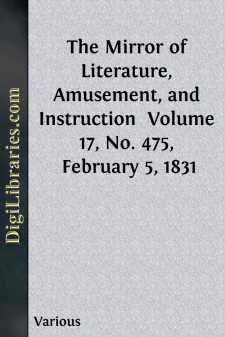Categories
- Antiques & Collectibles 13
- Architecture 36
- Art 48
- Bibles 22
- Biography & Autobiography 813
- Body, Mind & Spirit 142
- Business & Economics 28
- Children's Books 15
- Children's Fiction 12
- Computers 4
- Cooking 94
- Crafts & Hobbies 4
- Drama 346
- Education 46
- Family & Relationships 57
- Fiction 11828
- Games 19
- Gardening 17
- Health & Fitness 34
- History 1377
- House & Home 1
- Humor 147
- Juvenile Fiction 1873
- Juvenile Nonfiction 202
- Language Arts & Disciplines 88
- Law 16
- Literary Collections 686
- Literary Criticism 179
- Mathematics 13
- Medical 41
- Music 40
- Nature 179
- Non-Classifiable 1768
- Performing Arts 7
- Periodicals 1453
- Philosophy 64
- Photography 2
- Poetry 896
- Political Science 203
- Psychology 42
- Reference 154
- Religion 513
- Science 126
- Self-Help 84
- Social Science 81
- Sports & Recreation 34
- Study Aids 3
- Technology & Engineering 59
- Transportation 23
- Travel 463
- True Crime 29
The Mirror of Literature, Amusement, and Instruction Volume 17, No. 475, February 5, 1831
by: Various
Categories:
Description:
Excerpt
THE PRINCESS ELIZABETH'S COTTAGE, WINDSOR.
They who draw their notions of royal enjoyment from the tinsel of its external trappings, will scarcely believe the above cottage to have been the residence of an English princess. Yet such was the rank of its occupant but a few years since, distant as may be the contrast of courts and cottages, and the natural enjoyment of rural life from the artificial luxury—the painted pomp and idle glitter of regal state.
The above cottage stands in the grounds of Grove House, adjoining the churchyard of Old Windsor. It was built under the superintendent taste of the Princess Elizabeth, second sister of the present King, and now known as the Landgravine of Hesse Homburg. To the decoration of this cottage the Princess paid much attention: it is quite in the ornée style; and its situation is so beautiful as to baffle all embellishment.
Grove House, the seat of Lady Dowager Onslow, of whom the Princess purchased the whole property, was built by Mr. Bateman, uncle to the eccentric Lord Bateman. This gentleman made it a point in his travels to notice everything that pleased him in the monasteries abroad; and, on his return to England, he built this house; the bedchamber being contrived, like the cells of monks, with a refectory, and every other appendage of a monastery; even to a cemetery, and a coffin, inscribed with the name of a supposititious ancient bishop. Some curious Gothic chairs, bought at a sale of the curiosities in this house, are now at Strawberry Hill.
Old Windsor gives rise to many more interesting reminiscences; and few who "suck melancholy from a song" would exchange its sombre churchyard for the gayest field of fancy. We may be there anon.
ENGLISH SUPERSTITION.
(For the Mirror.)Sir Walter Scott, in his history of Demonology and Witchcraft, has omitted a tradition which is still popular in Cheshire, and which from its close resemblance to one of the Scottish legends related by that writer, gives rise to many interesting conjectures respecting the probable causes of such a superstition being believed in countries with apparently so little connexion or intercourse, as Cheshire and Scotland. The facts of Sir Walter's narration are as follow: vide Demonology and Witchcraft, p. 133.
"A daring horse jockey having sold a horse to a man of venerable and antique appearance, had a remarkable hillock on the Eildon Hills, called Lucken Hare, appointed as the place where, at twelve o'clock at night, he should receive the price. He came, the money was paid in an ancient coin, and he was invited by the purchaser to view his residence. The trader followed his guide through several long ranges of stalls, in each of which a horse stood motionless, while an armed warrior lay equally still at his charger's feet. 'All these men,' said the wizard in a whisper, 'will awaken at the battle of Sheriffmoor.' A horn and a sword hung suspended together at one extremity of the chamber. The former the jockey seized, and having sounded it, the horses stamped, the men arose and clashed their armour; while a voice like that of a giant pronounced these words:—
"Woe to the coward that ever he was born,
Who did not draw the sword before he blew the horn."
Subsequent to this, Sir Walter proceeds to the relation of another kindred tradition, the incidents of which do not materially differ from those of the preceding....












